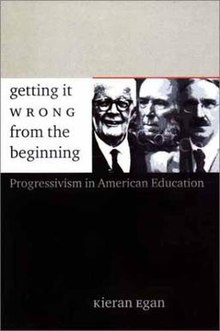Getting It Wrong from the Beginning
 Hardcover edition | |
| Author | Kieran Egan |
|---|---|
| Language | English |
| Subject | Philosophy |
| Genre | Non-fiction |
| Publisher | Yale University Press |
Publication date | 2002 |
| Publication place | United States |
| Media type | Print, e-book |
| ISBN | 0-300-09433-7 |
Getting it Wrong from the Beginning: Our Progressivist Inheritance from Herbert Spencer, John Dewey, and Jean Piaget is a 2002 book by Kieran Egan criticizing the traditional progressivist foundations of modern education in the Western World. Egan primarily focuses on the work of Herbert Spencer, John Dewey, and Jean Piaget as the most influential sources of contemporary educational philosophy.[1][2] Egan identifies this book in its introduction as being a companion to his previous work The Educated Mind.[3]
Main Arguments
Kieran Egan states in his introduction: "I want to make the case here that most of the beliefs most of the people hold about education today are wrong in fairly fundamental ways."[3] According to Egan, Herbert Spencer was one of the key figures in proliferating the progressive foundations of education. These ideas were further championed by John Dewey and supported with research and writing by Jean Piaget. Egan's assertion is that these foundations are fundamentally flawed.[4] The core tenets of progressivism he questions are: the idea that things (especially learning) always go from simple to complex, the notion that the matters of the mind can be treated like those of the biological body, and that all child-learning should occur as a child learns during play. He also questions the call for utilitarianism in education and the value of educational research. In this book, Egan provides examples and logic based arguments which counter these ideas.[3]
Criticism
The book has been criticized for not providing adequate solutions to the problems it identifies in education.[1][2] Readers looking to hear the author's proposed solutions would be advised to read his other work, most notably The Educated Mind: How Cognitive Tools Shape Our Understanding.
Reviews
- Aeschliman, M. (2003). Cults of Ignorance. National Review, 55(8), 48-50.
- Emery J Hyslop-Margison (2001) in Canadian Journal of Education / Revue canadienne de l'education, vol. 26, no. 4, p. 515-517
- James Conroy, (2005) in Theory and Research in Education, 3, no. 3 : 371-374
- Limond, D. (2005). Getting it wrong from the beginning: our progressive inheritance from Herbert Spencer, John Dewey, and Jean Piaget. Educational Review, 57(1), 113-114.
- Turner, D.(2006). Book Reviews. Educational Review, 58(4), 489-516.
References
- ^ a b Turner, D.(2006). Book Reviews. Educational Review, 58(4), 489-516.
- ^ a b Limond, D. (2005). Getting it wrong from the beginning: our progressive inheritance from Herbert Spencer, John Dewey, and Jean Piaget. Educational Review, 57(1), 113-114.
- ^ a b c Egan, K. (2002). Getting it wrong from the beginning. Binghamton, New Haven: Yale University Press.
- ^ Aeschliman, M. (2003). Cults of Ignorance. National Review, 55(8), 48-50.
